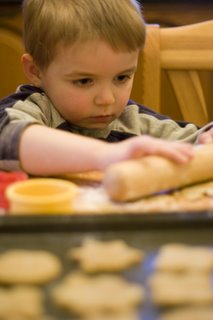It’s a quiet afternoon, and I have been looking through a Michael Olaf Company catalog with a sense of thankfulness that this business has dedicated 25 years to giving us such fine choices of real tools and implements for our children. From cutlery and cleaning equipment, to basins and buckets, the offerings are simply beautiful.
As a little girl, I had a real broom, a real spade, a real watering can shaped like an elephant. I could do real work with these tools, and earned a feeling of accomplishment from using them that no plastic extravaganza could provide. I remember that the most exciting real implement I ever received was a patty pan. Shaped just like a real pie plate, it was sized for my small hands.
Alongside my mother, the world’s greatest pie baker, I made real pastry dough, rolled out a real crust, cut up real apples and seasoned them. I baked my work in a real oven as I perched on a kitchen chair, sniffing the gorgeous perfume of simmering apples, learning the lessons of patience. The end result was a real little pie that I could smell, taste and share with my family. Just as Maria Montessori predicts, my accomplishment not only gave me confidence in the real kitchen, it also enabled me to contribute to the happiness of my family – both important goals for any child.
 I am so grateful to my mother for understanding that I wanted to be powerful, like her; that I wanted real goods to be provided for me with which to work. Some of my happiest memories are of the fun and excitement I felt planting gardens, baking cookies, being a valued part of family conversation at the dinner table. I was given the message that I was capable of digging in the dirt, decorating the special Christmas cookies, speaking with people of all ages. As an adult, I approach all of these tasks in daily life with both confidence and pleasure.
I am so grateful to my mother for understanding that I wanted to be powerful, like her; that I wanted real goods to be provided for me with which to work. Some of my happiest memories are of the fun and excitement I felt planting gardens, baking cookies, being a valued part of family conversation at the dinner table. I was given the message that I was capable of digging in the dirt, decorating the special Christmas cookies, speaking with people of all ages. As an adult, I approach all of these tasks in daily life with both confidence and pleasure.
My experiences of joy in childhood bring a few lovely books to mind that I’d like to recommend to you. My first suggestion is for toddler-aged children. We Help Mommy by Jean Cushman and We Help Daddy by Mini Stein were published by Golden Books and illustrated by the celebrated artist Eloise Wilkin. In both of the these books, a young brother and sister are trusted to accomplish real work around the home including small construction projects, doing laundry, tidying rooms, yard work and baking. The self-sufficiency of the children is celebrated and the message is quite clear that the tasks they accomplish make family life pleasanter for everyone. Sadly, the books have been allowed to go out of print, but you can still find them used fairly easily and I believe any Montessori parent or teacher will appreciate the intelligent and peaceful themes featured here.
My second suggestion is for any child who has attained confidence in reading chapter-type books. The Secret Garden is a children’s classic by a contemporary of Dr. Montessori, Frances Hodgson Burnett. In this fascinating story, a little orphan girl named Mary is sent to live with her guardian in his lonely house on the Yorkshire Moors. She is left very much to herself, but when asked if she would like a gift of some kind for her amusement, Mary requests a little spade, trowel and some seed packets.
She is befriended by a taciturn old gardener and a boy who cares for wild animals, and her ramblings lead her to the discovery of a locked door in a garden wall. When the key is found, Mary works with diligence and creativity to bring a neglected garden back to beautiful life. The character of Mary is a winning one, as she shows us her desire to have ‘a little piece of earth’ all her own on which she can work, do something useful, see some real return on her efforts. In the end, Mary’s work brings about more than one happy outcome for the people in her life.
In my Montessori training, it was mentioned that there’s a certain phenomenon that takes place when people get older. After working hard for many years at their profession – often one set in an office or other sterile setting – they take up gardening, golf, knitting, woodworking, or a dozen other “hands-on” activities. Even as adults, there is a longing to get back to the soil, metaphorically speaking: to create something by the force of your own efforts. Many times, people didn’t get enough tactile experiences as children, and seek them out when they are older. How many of us turn to crafts and hobbies for emotional and spiritual refreshment?
Dr. Montessori realized this fact: children are longing for the chance to participate fully in the real work of life. This fact is in danger of being drowned out by the commercial media message that the years of childhood should be spent in a series of distractions and passive entertainments. For loving parents and teachers, respecting the mind of the child means providing the quality tools and abundant opportunities that children need to become useful and respected contributors to the human family.

